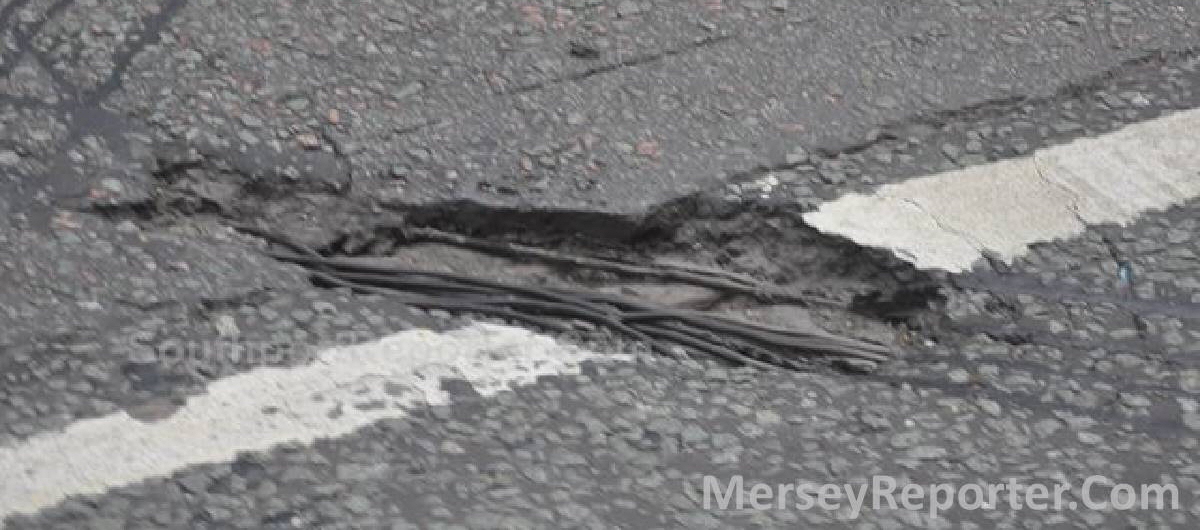North West receiving £1.2 billion recommitted from the Northern leg of HS2 for pothole repairs and road resurfacing projects

A programme of pothole repairs and road resurfacing
projects for the North West, made possible by the 1st tranche of £1.2 billion in
reallocated HS2 funding for the Region, has been revealed; with the 1st set of
roads already resurfaced to make journeys safer, faster and smoother
In November 2023, the UK Government announced an unprecedented £8.3 billion
investment to tackle badly surfaced roads and pothole ridden streets across
England, with the North West receiving £1.2 billion recommitted from the
Northern leg of HS2, over an 11 year period.
Councils in the North West have already been paid over £19 million to get on
with the work and deliver improvements, with another £19 million following in
this financial year. As a condition of this funding, and to make sure money is
being spent on pothole repairs, local authorities are required to publish a 2
year plan detailing exactly which local roads will benefit.
On 10 April, the Department for Transport revealed the local authorities
receiving funding across the North West which have responded to the Department's
survey request to set out their plans, meaning local people can now check their
local Council's websites and scrutinise their plans for themselves.
An initiative intending to bring increased transparency to how local Councils
deliver taxpayer-funded improvements, residents in the North West can now
immediately see the benefits to their area made possible by reallocated HS2
funding, holding their local authority to account for delivering local road
improvements.
The reporting requirements have highlighted how emerging techniques and
equipment are being used to tackle potholes in the North West, such as in
Lancashire, where Councils are using materials made of recycled plastics and
so-called bio-binders to fill potholes in a low carbon way.
The Department has already been clear with those local authorities that have
failed to publish reports that they could see the withdrawal of future funding
to resurface roads.
From Carlisle to Crewe, people across the North West are encouraged to check
their authority websites and see which roads are planned to be improved, and
routes where work has already taken place, for example:- the B5345 at Whitehaven
and the A50 at Knutsford.
The £8.3bn roads resurfacing fund demonstrates our commitment to improve local
transport across the country and is the largest ever funding boost for local
road improvements, made possible by reallocated HS2 funding.
All of the £19.8 billion saved from the Northern leg of HS2 will be reinvested
in transport across the North, all of the £9.6 billion saved from the Midlands
leg will be reinvested in transport across the Midlands, with the £6.5 billion
saved through the new approach at Euston being spread across every other Region
in the country. Projects and improvements in the South and East of England are
made possible by savings from Euston.
Transport Secretary Mark Harper said:- "We're on the side of drivers,
which is why this Government is getting on with delivering our plan to invest
£1.2 billion in the North West as part of the biggest ever funding increase for
local road improvements, made possible by reallocated HS2 funding. Alongside
this unprecedented funding, which is already being used to improve local roads,
we're making sure residents can hold their local authority to account and see
for themselves how the investment will be spent to improve local roads for years
to come."
Having submitted their first reports last month, Councils in the North West will
now also be required to submit quarterly reports from June, announcing work
which has taken place over three months, meaning residents will now regularly be
able to scrutinise the progress their local authority is doing to tackle
potholes. For many Councils, this may well be the first time they have reported
their roads resurfacing plans in detail, so we would expect the overall quality
of reporting from Councils to improve over time and the Department will keep the
quality of their reporting under review in the interests of taxpayers.
The Government's long-term plan to improve local road networks across the
country could save motorists up to £440 on vehicles repairs and is the biggest
ever uplift in funding for local road improvements.
This Government is backing drivers, and alongside the unprecedented increase in
road maintenance funding, it is delivering for motorists through the Plan for
Drivers, ensuring traffic schemes like Low Traffic Neighbourhoods and 20mph
speed limits have buy in from local people, cutting congestion and accelerating
the rollout of electric vehicle chargepoints.
RAC head of policy Simon Williams said:- "It's very encouraging to see so
many local authorities quickly setting out how they'll use the first tranche of
the Government's reallocated HS2 funding to improve their roads. Drivers will be
pleased to see potholes fixed and roads resurfaced, especially as our research
shows the poor state of local carriageways is their number-one concern. We hope
Councils will also use this extra money to carry out vital surface dressing work
which helps prevent cracking in the cold winter months by sealing roads against
water ingress. The prime time for this life extending work is between:- April
and September, so time is of the essence."
Carer's Leave Act North West Regional Polling Data reveals immense challenges for unpaid carers
THE Carer's Leave Act came into force on:- Saturday, 6
April 2024. It will entitle the 10m unpaid carers across the UK to 1 week's
unpaid leave each year to care for their loved ones. On the back of this the
results of a survey conducted by OnePoll on behalf of GoodOaks Homecare's:-
'You Are Not Alone' campaign where released to the MDIS. The survey
aimed at raising awareness of the support options available to unpaid carers
across England, but shockingly it has reviled that 58% of unpaid carers across
the North West who responded felt they have been or are unable to meet their own
health and wellbeing needs, often while prioritising the needs of those they
cared for. Following the publication of the findings, Damian Green MP, Chair of
the Adult Social Care APPG, has recently stated that:- "ignoring the
issues affecting unpaid carers only compounds the difficulties of the sector."
The survey also found that more than 54% of carers in the North West had felt:-
'stressed' in the week before the polling; 12% higher than the general
public, when compared with YouGov's weekly mood tracker. Unpaid carers in the
Region were also more than twice as likely to have felt lonely as the public in
the same period. Just 26% said they had felt:- "happy" in the week
prior to the survey.
The findings appear to corroborate the research conducted in 2023 by Carers UK
and 6 other charities which found that 31%, representing 8 million people, who
have provided unpaid care have reported a decline in their health and
wellbeing.
Unsupprisinly for the UK today, the report has found that the Carer's Leave Act
is a mystery to many... The publication of the polling in the report:-
'Caring Unseen,' which uncovers carers wellbeing in several Regions
across England alongside their awareness of care support options, political
outlook, and future projections, coincides with the recent implementation of
the:- 'Carer's Leave Act,' which will give unpaid carers a
statutory right to a week's unpaid leave to give or arrange care for a
dependant.
The bill was sponsored last year by Liberal Democrat MP Wendy Chamberlain, who
said the legislation would:- "allow carers to take time off work to manage
caring responsibility... {and} will provide many people with the flexibility
they need."
Despite promising parliamentary progress, the polling identified a significant
lack of awareness among unpaid carers in the North West of the Carer's Leave Act
itself. Just 14% of those polled in the Region said that they had a:-
"good understanding" of the Act; the lowest of all care support options
offered in the questioning, which included:- the Carer's Allowance, Personal
Independence Payments, and Carer's Credit, among others.
Targeted questioning yielded similar findings, with just 14% described
themselves as:- "very aware," and a further 20% as:-
"somewhat aware" of the Carer's Leave Act provisions. 52% of unpaid
carers polled described themselves as:- "unaware" (either:-
'very' or 'somewhat') of the Act's stipulations. Those in
the North West were slightly more:- 'unaware' than the average of all Regions,
which stood at:- 51%.
Interestingly, as age increased, awareness declined significantly. Net awareness
of the Act's provisions across England fell from:- 47% among:- 18 to 24 year
olds, to just 12% for those over 65.
when it can to the UK's political outlook, when asked to assess how effectively
they thought the UK Gvernment supported unpaid carers, the results were damning.
Nearly 60% believed that the Government was:- "ineffectively"
supporting those providing care for their loved ones. This figure included:- 26%
of carers polled in the North West who deemed the Government 'very'
ineffective.
Just 4% thought the Government was supporting unpaid carers:- "very
effectively."
Asked which political party they believed would provide the best support for
unpaid carers, just:- 10% of respondents opted for the Conservatives. The Labour
Party received far beyond the highest share of all parties, at:- 56%. The
Liberal Democrats, despite recent assurances that care would be placed at the
heart of their policy agenda, were selected by just four per cent of respondents
while Reform UK were at 2%. 24% of those polled selected no political party.
The report nonetheless found a particular; and significant; malleability in the
voting intention of unpaid carers. Asked about the likelihood of changing
their:- "vote in favour of a political party that introduced further measures to
support unpaid carers." It shows that 56% of respondents said they would be:-
"likely" to do so, either:- 'somewhat' or 'very.'
Just 12% described themselves as:- "unlikely" to do so.
Given the stark reality of the situation for many carers, as per the polling, it
is alarming that optimism towards the future also appears lacking.
56% of those polled anticipated their ability to care for their loved ones would
stay the same or worsen in the coming:- 18 to 24 months.
40% predicted that their ability to provide care for loved ones would improve; a
figure somewhat skewed by unpaid carers in younger age cohorts. Across England,
carers aged 65 and over were considerably less optimistic:- just 16% anticipated
their ability to provide care would improve. In comparison, 34% expected it to
worsen, and 45 per cent predicted no change.
Perceptions about the sustainability of care provision also varied widely,
particularly by age group. 44% of unpaid carers in the North West believed their
care provision was sustainable, while 30% believed it was unsustainable. In most
age groups of nationwide respondents, those who perceived their care as
sustainable outweighed those who responded the opposite; apart from among:- 55
to 64 year olds. In this age range, 31% perceived their care as sustainable, 33%
said it was not.
Ben Ashton, Founder of the You Are Not Alone campaign, and Chief Executive of
GoodOaks Homecare, who commissioned the poll, said:- "Our You Are Not
Alone campaign has shed light on the immense challenges faced by those
dedicating their lives to care for others, often at great personal cost. This
should serve as a wake up call to our nation's leaders. The Carer's Leave Act is
a step forward, but our research underscores a significant gap in awareness and
support. It is imperative that we recognise and act upon the urgent necessity to
better support our unpaid carers. They are the backbone of our care system. Our
commitment to those who provide care must match the depth of their commitment to
others."
In a foreword to the report, Damian Green MP, Chair of the All-Party
Parliamentary Group for Adult Social Care, said:- "Too often the debate on
social care is concentrated entirely on the part of the sector in which care is
paid for. This part of the sector has problems enough, but ignoring the issues
affecting unpaid carers only compounds the difficulties of the sector. This
report is a reminder to policy makers that the millions of unpaid carers deserve
not just recognition but practical help to make their lives more comfortable."
Do you agree with these findings? We would hove to hear your views, so please do
email them to our Newsroom at:- News24@SouthportReporter.Com
or send us a message on:-
Mastodon,
Facebook or
Twitter.









